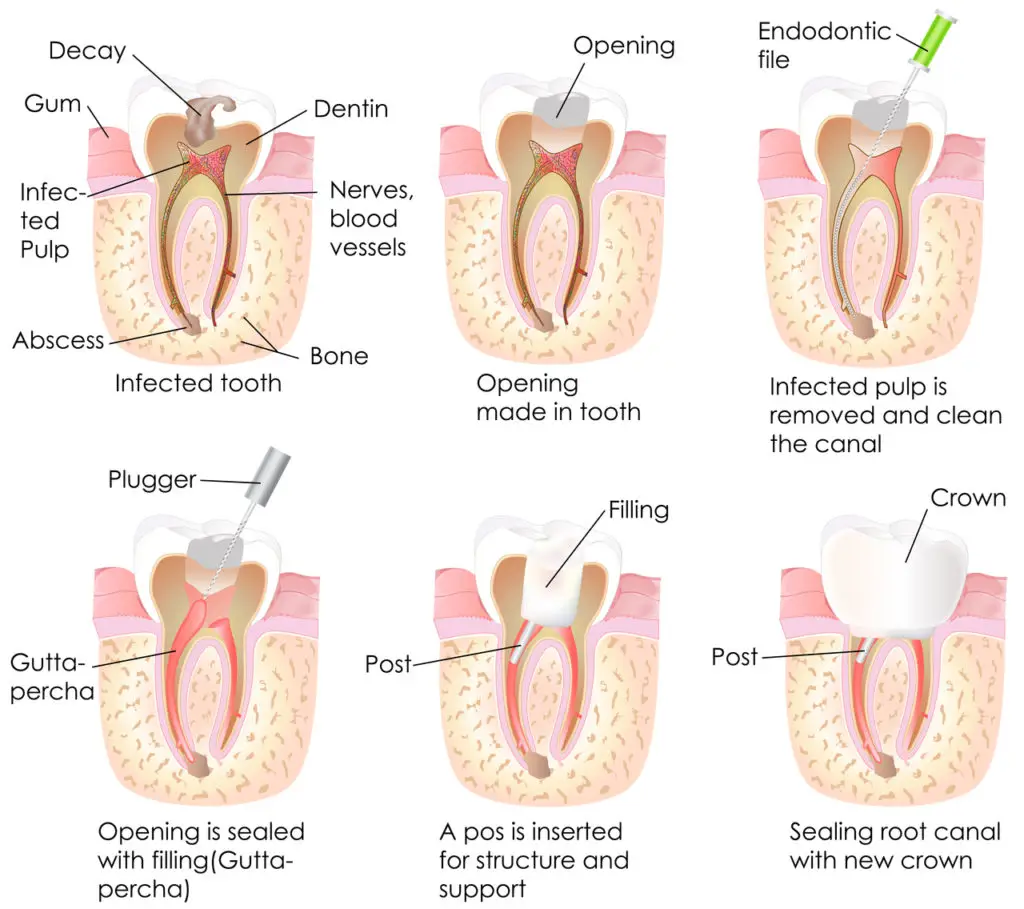In dentistry, root canal treatments are a crucial intervention to save teeth affected by infection or inflammation. Over time, this treatment method has evolved and is now an essential part of dental practice. In this blog post, we will talk in detail about root canal treatments: When they are necessary, how they are performed, what procedures exist and what to look out for during treatment.
When are root canal treatments necessary?
Root canal treatments are needed when the inner tissue of a tooth, known as the pulp, is infected or inflamed. This can be caused by deep decay, a fractured tooth or an injury. Typical signs that root canal treatment may be required include
– Severe toothache, especially when chewing or touching the tooth.
– Sensitivity to hot or cold drinks.
– Swelling of the gums around the affected tooth.
– A dark discolouration of the tooth.
If these symptoms occur, it is crucial to see a dentist immediately for a thorough examination and to determine if root canal treatment is necessary.
How are root canal treatments carried out?
The purpose of root canal treatment is to remove the infected or inflamed pulp from inside the tooth, clean and disinfect the root canals and then seal the tooth with a filling material to prevent further infection. The process usually involves the following steps:
- Anaesthesia: The dentist will numb the affected area to ensure that the patient does not feel any pain during the treatment.
- Access to the root canal: By drilling a small hole in the affected tooth, the dentist gains access to the root canal.
- Removal of the pulp: The infected or inflamed pulp is removed from the root canal using special instruments such as fine files and irrigation.
- Cleaning and disinfection: The root canals are thoroughly cleaned and disinfected to remove all bacteria and infections.
- Filling of the root canal: After the root canals have been cleaned and disinfected, they are sealed with a filling material such as gutta-percha to prevent re-infection.
- Tooth restoration: The tooth is restored with a filling or crown to restore its stability and functionality.
What aspects should be considered during treatment?
There are a few important points to bear in mind during root canal treatment:
– An accurate diagnosis is crucial to ensure that root canal treatment is actually necessary and that all affected canals are identified.
– Precise and careful execution of the treatment is necessary to eliminate all infections and preserve the affected tooth.
– Aftercare plays an important role in ensuring that the treated tooth remains healthy and further problems are avoided.
Are root canal treatments painful?
Root canal treatments have a reputation for being painful, but most patients experience minimal discomfort or even no pain at all during the procedure. Thanks to modern methods and anaesthetic procedures, the sensitivity to pain during root canal treatment has been significantly reduced.
Before treatment begins, the affected area of the mouth is carefully anaesthetised to ensure that the patient feels no pain. In some cases, the dentist may also offer additional sedation to further relax the patient.
During the actual procedure, slight sensations of pressure or touch may occur, but these should not be painful. Occasionally, mild discomfort or swelling may occur after treatment, which can usually be alleviated with over-the-counter painkillers.
It is important to understand that the purpose of root canal treatment is to relieve pain caused by an infected or inflamed pulp. The procedure removes the infected part of the tooth and in the long term this leads to relief from pain and discomfort.
However, it should be noted that each patient is individual and sensitivity to pain can vary. If a patient has concerns about possible pain during root canal treatment, they should discuss this with their dentist. The dentist may take additional measures to make the procedure as comfortable as possible for the patient.
Conclusion:
Root canal treatments are a proven method of saving infected or inflamed teeth and maintaining oral health.
By recognising and treating problems early, dentists can help to alleviate pain, preserve teeth and improve the quality of life of their patients. If you notice any signs that could indicate root canal treatment, don’t hesitate to visit a dentist. They will carry out a thorough examination to ensure you receive the best possible treatment.












